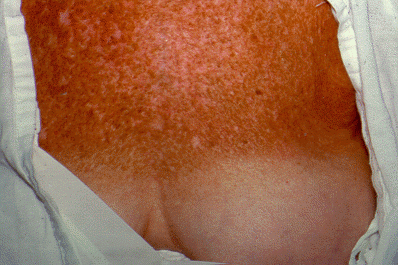To have a pleasing appearance is a basic human desire. We are bombarded with advertising for products claiming to help our skin stay healthy and young-looking. What is true and what is fiction? Here are some facts that may help you develop your own skin care routines.
I.Common Concerns:
Skin aging We all develop wrinkles with age; however, much wrinkling results from sun damage, not age. Fair-skinned persons who have spent a great deal of time in the sun usually have skin that is much more wrinkled and weather-beaten than people with dark skin. Fortunately, effective sunscreens (SPF 15 or higher) are available so people can continue an active outdoor life while partially protecting themselves from the wrinkling and aging effects of the sun. If you value your youthful looks, never deliberately sunbathe. Stay away from tanning parlors. The ultraviolet rays they use damage the skin, though the operators will tell you otherwise.
Anti-wrinkle cream –Scientists have spent a great deal of time, effort and money in the search for a substance that will stop wrinkling and reverse skin aging. So far, the best treatments are Retin-A (Renova, tretinoin) and alpha hydroxyacids, as well as natural treatments such as Xtend-Life Skincare.
Retin-A is a medication which can be prescribed by a doctor, which will reverse very fine wrinkles and some of the effects of sunlight. Retin-A has been used safely for the last twenty years. The long-term side effects (longer than twenty years) of Retin-A are still not known.
Do moisturizers work? Yes and no. For most people, these products produce temporary lubrication and smoothing of the skin. After a few hours, the skin will be the same as before. Moisturizers do not prevent wrinkles or skin aging unless they contain sunscreen. Moisturizers with alpha hydroxyacids can reverse sun spots, fine lines and will also improve acne.
What’s the best way to cleanse your skin? Use water and a little mild soap, such as Dove or Basis. If you have very dry, sensitive skin and cannot tolerate soap, water will get you clean enough. If you wear heavy makeup, use a cold cream to remove it and then use water to remove the cold cream. For most people, the kind of soap you use makes little difference. Find one that your skin tolerates and you like, then stick with it. Don’t be sold on the idea that “deep cleaning” is necessary to rid your skin of dirt and “impurities.” This is advertising hype. The same applies to abrasives, skin peelers, and beauty masks that “restore” or “renew” your skin. All these agents do is peel off dead outer layers of skin, which, if left alone, would peel off spontaneously in a few days.
Can makeup cause pimples? Sometimes. Heavy, greasy makeup (such as stage makeup) can cause blackheads and pimples or aggravate acne in people who already have it. Most, but not all, oil-free makeup is safe and does not worsen acne. If this matter concerns you, please discuss it with me. No matter what makeup you use, thoroughly remove it at night, using a lot of water and a little soap.
What benefits can one expect from facial masks? The actual benefits are few, though facials can feel pleasant and relaxing. Facial masks can cleanse the skin and leave it looking and feeling smooth for a few minutes to a few hours. As the mask dries, it produces a tightening, tingling feeling that makes one think something is happening. There is no scientific evidence to support the claims that facials will prevent skin from aging or reverse changes that have already occurred.
Do facial exercises prevent wrinkles? No, they do not. The opposite is true. Facial movements cause wrinkles. Wrinkles actually flatten out and sometimes disappear in persons whose face muscles are paralyzed because of a stroke or nervous disease.
What can you do about wrinkles? Start a Start a skin rejuvenation regimen of tretinoin, and alpha hydroxyacid to reverse some of the changes of aging and to slow down the aging process. Some physicians use face lifts, dermabrasion, TCA peels, laser resurfacing or collagen injections to smooth out wrinkles. Face lifts, dermabrasions, and laser resurfacing are significant surgical procedures. They are expensive, painful, and require several weeks for recovery. While sometimes these produce a great deal of improvement, this is not always the case. There may be a poor result or scarring. Collagen injections can also be used, although rarely collagen can cause a highly unpleasant local reaction. The improvement following collagen injections lasts only about six months to one year, the collagen then degrades, and the skin is as wrinkled as before.
II.Summary:
If you value your youthful looks and want to avoid wrinkling, protect yourself from the sun by putting on a sunscreen each morning of SPF 15 or higher. This is especially important if you are fair-skinned.
Cosmetics are a safe way to temporarily lubricate your skin and conceal blemishes and imperfections. Keep your cosmetic routine simple, and stick to a few products that agree with your skin. Don’t get involved in elaborate routines with cleansers, astringents, “deep cleansing,” night creams, skin tighteners, etc. Keep in mind that cosmetics only conceal, they don’t heal.
Start a skin rejuvenation regimen of tretinoin and alpha hydroxyacid to reverse some of the changes of aging and to slow down the aging process.
III.References:
1. The Look You Like. Sponsored by the American Academy of Dermatology, Marcel Dekker, Inc. 1990.
2. Common Skin Disorders. 3rd Edition. Medical Economics Company, Inc. 1988.

